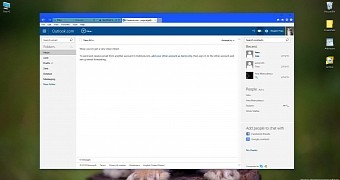Microsoft has just announced its decision to remove Facebook and Google Chat from Outlook.com, pointing out that users can continue chatting with friends and family with the built-in Skype features.
In an email sent to customers this morning, Microsoft explains that its decision to offer Skype as the sole chatting solution in Outlook.com is Google's recent announcement that it would discontinue the chat protocol that Google Talk currently relies on, so the company had no other option than to remove it too.
As far as Facebook support is concerned, Microsoft hasn't provided any other details, but it has mentioned that Skype is already the top choice for the majority of Outlook.com users, so the decision to remove support for these two services shouldn't affect too many people.
“We understand that this may disappoint some of our customers, but we hope that you’ll try Skype for Outlook.com chat, and voice and video calling, so you can take advantage of the more robust ways to keep in touch with friends and family,” the company said.
Blame Google for the decision
In the email that Microsoft submitted to users this morning, the software giant also included a link to a Google announcement where the search firm confirms its decision to drop XMPP support.
XMPP, previously known as Jabber, is a protocol that could be implemented by third-party services for chat services. Without XMPP support, Outlook.com cannot provide communication features with Google Talk contacts, so that's why Microsoft had no other option than to remove it completely. Hangouts, which replaced Google Talk, no longer supports XMPP.
Microsoft's removal of Facebook and Google Chat will take place “within the next couple of weeks,” so the company recommends everyone to move all contacts to Skype to be able to chat from Outlook.com.
Skype also offers support for Microsoft account and can be accessed with a variety of clients, including mobile and desktop applications released by the Redmond company itself.

 14 DAY TRIAL //
14 DAY TRIAL //